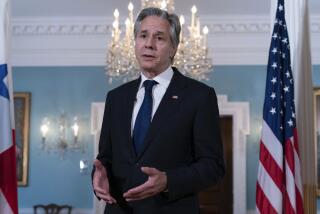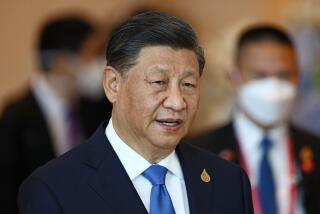Yeltsin May Be Toppled, U.S. Defense Chief Warns : Russia: Cheney says Washington hopes president survives but conflict is a concern.
- Share via
WASHINGTON — In one of the gloomiest high-level assessments yet of Russia’s political turmoil, Defense Secretary Dick Cheney acknowledged Saturday that it is possible that Russian President Boris N. Yeltsin will eventually fall from power.
Asked in a CNN television interview whether the Russian president will survive another year in office, Cheney replied: “I don’t know. . . . The conflict that’s building there raises the possibility that there could be a change.”
The defense secretary quickly added that the United States does not want Yeltsin to lose out to his political opponents.
“I hope he does (survive), certainly, because he’s the foremost and most effective advocate of reform and building democracy inside of Russia,” Cheney said. “At this point, I think Boris Yeltsin deserves our support.”
Cheney’s remarks came only four days after Russia’s Congress of People’s Deputies, the country’s Parliament, handed Yeltsin a serious defeat by rejecting his proposal to keep acting Prime Minister Yegor T. Gaidar, a leading economic reformer, on the job permanently. On Saturday, Yeltsin and the Parliament reached a compromise under which Gaidar could stay in office for at least another four months.
Until very recently, U.S. intelligence agencies had remained cautiously optimistic about Yeltsin’s prospects.
On Monday, John McLaughlin, director of Slavic and Eurasian analysis for the CIA, said in a speech that the Russian president “has a fair chance of succeeding.” He warned, however, that if Yeltsin were to lose the parliamentary vote on Gaidar’s future, “other vistas open up that are less promising.”
During nearly four years as defense secretary, Cheney has often been more pessimistic about political developments in Moscow than other high-level Bush Administration officials. He was among the first senior officials to warn that the United States should not link itself too closely to the fate of former Soviet President Mikhail S. Gorbachev.
These views appear to be related to Cheney’s efforts to avoid having the U.S. defense budget reduced too rapidly. Cheney suggested once again Saturday that the Pentagon needs to be prepared for changes in Russia that would increase the need for a strong U.S. military preparedness.
“The key point here is that there is enormous uncertainty about who is going to govern in Moscow over the next few years, and we have got to take that into account in our planning,” he said.
Speaking about the former Yugoslav federation, Cheney predicted Saturday that the United States and its allies will eventually enforce a “no-fly” zone--a U.N. ban on Serbian military flights over Bosnia-Herzegovina.
But the defense secretary said he wasn’t sure whether this would be done before the Administration leaves office next month.
“I don’t want to be that precise in terms of timing,” Cheney said. “I would support the enforcement of the no-fly zone. I think it’s the right thing to do. I think we ought to pursue it.
“But I think it’s got to be done on an international basis, the same way we’ve done everything else in Bosnia. It has to be under U.N. auspices and in conjunction with our allies.”
President-elect Bill Clinton had suggested Friday that he favors stronger U.S. action in Bosnia-Herzegovina.
“I think anything we can do to turn up the heat a little there to try to reduce the carnage is worth trying,” Clinton said.
More to Read
Sign up for Essential California
The most important California stories and recommendations in your inbox every morning.
You may occasionally receive promotional content from the Los Angeles Times.










